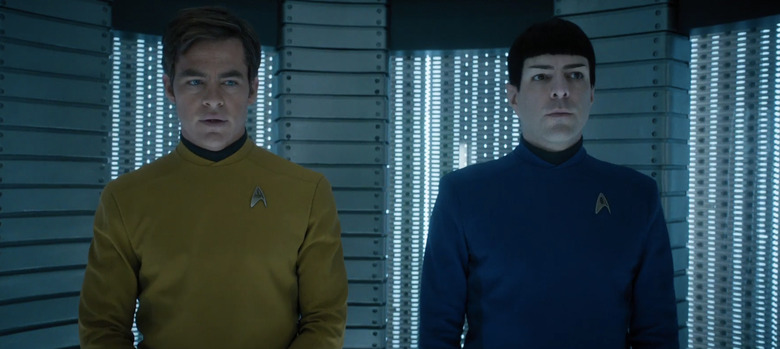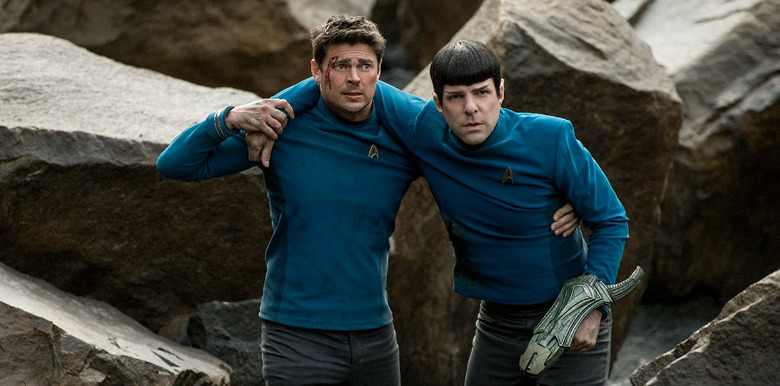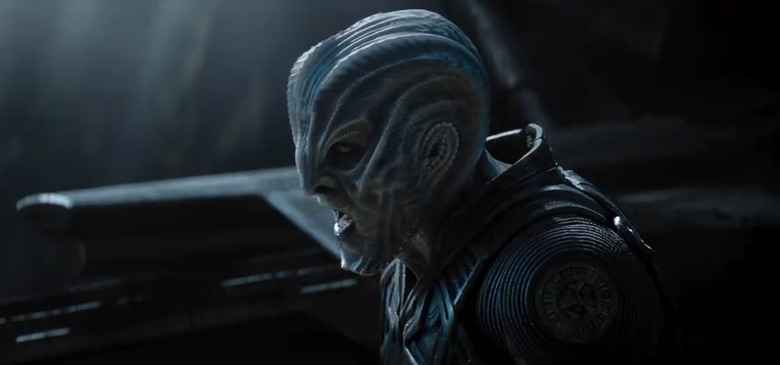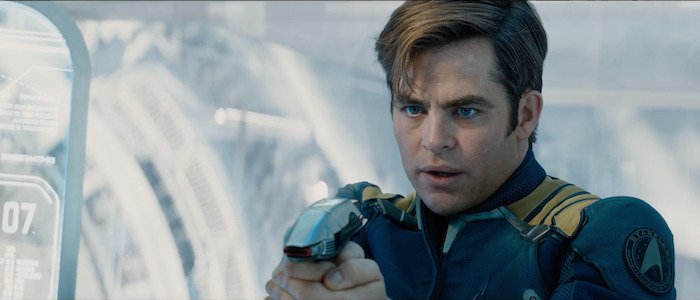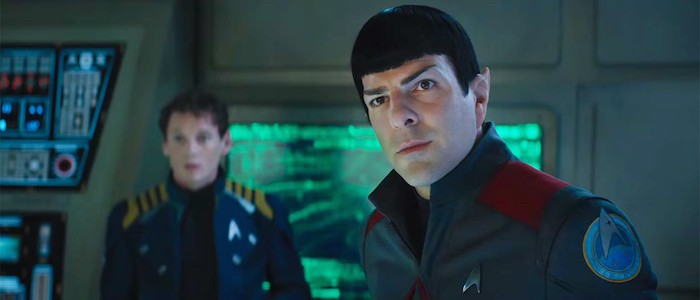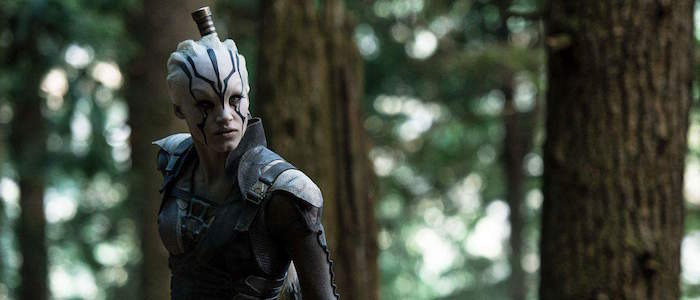'Star Trek Beyond' Spoiler Review: This Is The Most Positive Blockbuster Of 2016
In a summer seemingly defined by how disappointing so many movies have been, Star Trek Beyond is an oasis. It's crowd-pleaser that has something on its mind, a sequel that's not painfully beholden to massive franchise plans, and a story about the power of positivity overcoming darkness. In short, it's a unique release for 2016...and the right antidote for 2016.
And since it's Monday and you've had a chance to see it, let's take a deeper dive into what makes this movie tick.
What is Star Trek, Anyway?
When Star Trek Beyond first began screening, an old argument was dragged into the public yet again: what is Star Trek? And who is it for? And does this, the latest iteration of a 50-year old franchise, actually count as Star Trek or is it something the more serious fans, the aficionados who have studied Enterprise blueprints, should write off as not mattering in the grand scheme of things?
The truth is that this discussion is inherently silly. Star Trek isn't so easily identifiable as a single thing. It's too big for that. Even creator Gene Roddenberry couldn't make up his mind and his original "wagon train to the stars" pitch evolved over the years, transforming from heady, spacey, pulpy science fiction into something of a social document that used sci-fi as a backdrop for a utopian portrait. The original series is a different beast than Star Trek: The Next Generation. Star Trek: Deep Space Nine is a different beast than most of the movies. The Kelvin Timeline, the rebooted series created by J.J. Abrams, is its own animal.
And it is an animal that suits new director Justin Lin's sensibilities just fine. Although he grew up a Star Trek fan, Lin's interests are more varied. In Star Trek Beyond, you can see the other facets of his personality shining through. He likes fast vehicles and intense action. He has a soft spot for goofy humor. The blockbuster-friendly pacing that he perfected while transforming the Fast and Furious series from a terrible movie franchise into a hugely entertaining one is on display here. Lin may like Star Trek, but he's a jock at heart, the kind of kid who left the house to play basketball when other Trek fans cracked open those technical manuals. Star Trek Beyond is the obvious work of a casual fan – he's aware of the iconography, but nothing is sacred. Him blowing up the Enterprise in act one feels like statement.
Star Trek Beyond is Star Trek because it doesn't feel quite like what came before. That's the whole point of Star Trek. There are shades of the original series in how Kirk and the crew solve a trick problem on the Planet of the Week. There are shades of The Next Generation in how it holds humanity's unlimited potential up on a pedestal. There are even shades of Deep Space Nine, a show that continuously questioned the purpose of the Federation and Starfleet and explored what it means to function in a society where perfection is the norm. But most of all, Star Trek Beyond is a spirited adventure, an optimistic romp, a tale of colleagues, a makeshift family, coming together and fighting for what they believe in. Lin is a jock. His Captain Kirk, who even gets to drive a motorcycle like a more traditional action hero, is also a total jock. However, they're the kind of jocks who fraternize with the nerds and rely on them and treat them with the utmost respect. Star Trek Beyond isn't Trek at its smartest, but it's the first Trek movie in a long time that stands in awe of what a mixed team of experts from all different backgrounds can accomplish.
Splitting Up
Whenever I start watching a new television show, I give it a simple test. Could you take any two characters and separate them from the rest of the ensemble and enjoy their interactions? For the best shows, the answer is generally yes. A strong cast isn't made up of individuals – it's a team. Each actor, each character, serves a unique function. Watching those functions mix and match and bounce off one another must be a pleasure.
The crew of the Enterprise has been the chief draw of Star Trek since 1966. Watching this assortment of personalities gel on the bridge or on an away mission has always been a delight. At its best, Trek has always been an ode to teamwork. Remove one member of the bridge crew and watch things start to crumble. Everyone has one another's back. J.J. Abrams recognized this. Even through 2009's Star Trek struggles through its myriad of story speed bumps, Abrams inspires great joy by showcasing people doing their jobs well. Orders are issued and actions are performed and everyone looks like they know exactly what they're doing. There is a great deal of pleasure to be had in watching a well-oiled machine.
Star Trek Beyond shakes up the formula by removing the bridge, and the entire Enterprise, from the picture. Simon Pegg and Doug Jung's screenplay scatters the Enterprise crew across an uncharted planet, creating a few odd couples. Kirk and Chekov set out to locate the rest of the crew. Dr. McCoy struggles to save an injured Spock. Uhura and Sulu do some detective work from prison. Scotty meets a new ally in Jaylah, a stone-faced survivor and warrior. While all of these people are a blast in the same room, the dynamics that are created when they are paired off is immensely satisfying. Without backup, they must rely on one another and the film finds joy in how everyone steps up to fill the void of their missing crew mates. The temptation to create artificial drama in each pairing much have lurked over Pegg and Jung at all times, but they craft drama from characters coming together in the face of a desperate situation. It's a breath of fresh air after the overbearing negativity of Star Trek Into Darkness. People, Star Trek Beyond argues, can and will rise to the occasion.
While each pairing is fun, it's the McCoy and Spock scenes that rise to the top. There has always been a natural friction between these two – one lets his emotions lead the way while the other is, by the nature of his species and upbringing, a being of pure logic. The dynamic here isn't about these two coming to an understanding or learning that they're friends. They are already friends. They've reached an understanding ages ago. These two push each other's buttons in ways that only people who have been working together for three years can get away with. Their loyalty to one another is paramount and their affection obvious. They bicker and debate and insult like only true friends can. Star Trek Beyond's action scenes are already fading from my mind, but Spock and McCoy's conversations and gripings continue to linger. Cooperation is a thrilling thing, especially when its two parties with such different world views.
The New Additions
By now, the Enterprise crew feel like old friends and that's a combination of 50 years worth of reverence for these characters and the fact that the new cast is nothing short of a miracle. Recasting characters this iconic was a fool's errand and they somehow pulled it off. These men and women are as fun to watch now as they ever have been. Star Trek Into Darkness proved that they're still an effective bunch even when they're saddled with a total dog of a movie.
Star Trek Beyond introduces two new characters into the mix and the results are uneven. Without existing affection for these people, it's harder to forgive their flaws, especially when certain aspects of their storylines simply don't make much sense.
Let's start with Krall, the new villain played by Idris Elba. Conceptually, he's fantastic. As we learn late in the movie, this mysterious alien is actually Captain Balthazar Edison, a soldier whose career become obsolete when Starfleet was formed and a more traditional military was put out to pasture. Eventually, Captain Edison finds himself stranded on a planet with a very convenient super-weapon, a very convenient army of drones, and some very convenient technology that allows him to absorb the life-force of other beings to stay alive. For some reason, that life-giving tech seems to transform him into a monster...until he starts using it more and begins to resemble his old human self again. However, it's not clear exactly what he wants and it's not clear who makes up his army of henchmen. His motivations are intentionally vague at first and remain opaque even as he's battling Kirk in hand-to-hand combat to the death.
But think about Krall/Edison on paper! In a movie about how much we can achieve by pushing into the future, here's a literal relic from the past who is so hateful of change that he wants to kill millions of people. Here's a troubled soldier, a guy who only knows war, unable to comprehend a galaxy where peace is suggested before anyone even thinks of pulling a trigger. He's a powerful physical threat (he destroys the Enterprise for crying out loud), but he's also a symbolic threat. He's an enemy of the future. He's an enemy of progress. It's a genuine shame that this collection of fascinating ideas never quite gel on screen and that the movie never gives Elba a truly defining moment.
More successful is Jaylah, the alien refugee and scavenger played by Sofia Boutella. In addition to looking amazing (her make-up is a refreshing riff on Trek's "every alien has a weird forehead" tradition), she passes the most important test: she can hold her own amongst the Enterprise ensemble. She's tough and she's funny and she's hugely entertaining no matter who she's paired off with. Her final scene, where she is offered a chance to attend Starfleet Academy, is a big 'ol tease. Yes, of course I'd like to see her in a yellow or red uniform and working alongside everyone else.
Jaylah is so much fun and Boutella such an arresting screen presence that it's easy to overlook just how half-baked her storyline can be. Introduced as a tough-as-nails warrior of few words, the film teases out her backstory, puts her on a mission of personal redemption and then...drops it completely, canceling her arc in mid-stride to give Kirk an action beat. The intention is clear: Jaylah lost her family, but she has found a new one with the Enterprise crew. In execution, it's inelegant at best.
Action vs. Camaraderie
In his four Fast and Furious movies, Justin Lin proved himself adept at two things: shooting insane, creative action and shooting charismatic people you really like having conversations that you want to go on forever. One of those aspects made it into Star Trek Beyond.
What the hell happened to Star Trek Beyond's action? Lin shoots every fistfight and every phaser battle in cluttered, shaky close-ups cut together without rhyme or reason or attention to geography. I think there's a scene where the saucer of the ruined Enterprise tips over and crushes a villain, but it's so poorly staged that I just had to assume that was what happened. This is especially baffling because it's not like Lin is an action amateur and it's not like the rest of the film is so incompetently made. When the Enterprise enters a nebula, he stages the scene with the right notes of dread and wonder. When his characters first visit the Yorktown starbase, the sense of scale is palpable. Lin can sell spectacle and he sells it repeatedly throughout Star Trek Beyond, but this is a movie where the scenes involving everyone standing around and making plans for a prison break are far more exciting than the actual prison break.
But let's dwell on the optimistic angle here: this is a movie where characters standing around making plans for a prison break are exciting! Every dialogue-heavy scene is a treat, especially since the actors know their characters well by now and Pegg and Jung know Star Trek well enough to put the right words in their mouths. Lin has the perfect touch for these kinds of scenes. There's a quiet skill in directing conversations where every participant gets to shine and everyone from Scotty to Sulu gets their fair share of killer lines and beats. Lin treasures his ensemble and gives them the room they need and it pays off in a big way.
Hope, Optimism, and a Future Worth Fighting For
Every version of Star Trek has had its divergences from what has been established before, but there's one concept that forms the umbrella that hangs over the entire franchise: the future is a better, brighter place and mankind will work together to create a new standard. This was peppered throughout the thrilling roller coaster that is 2009's Star Trek, but it was almost entirely absent from Star Trek Into Darkness, which painted Trek's future as an illusion, a front illegal wars and false flag operations and everything else in your conspiracy theory handbook. Star Trek has featured bad apples before (Star Trek VI: The Undiscovered Country being the most obvious example), but the pervasive darkness and hopelessness of Into Darkness remains depressing. Star Trek has been critical of its own universe before, but that was the first time it has been portrayed as so profoundly broken.
Coming after Into Darkness, and arriving in a year where every real world headline brings with it another wave of despair, Star Trek Beyond is a rallying cry for rising above the muck. I've already discussed how the film mines so much drama and comedy from a cast of characters getting along and helping each other out to tight spots, but this general optimism, this can-do attitude, pervades every frame of the movie. It's in Kirk's final fight with Krall, where he pauses the punching to explain to the mass-murderer that he can find peace in this progressive future. It's in the care the Enterprise's command team showcases for the fellow members of their crew, risking life and limb to ensure their safety and rescue them when they're captured. It's in the scenes where characters come together and become smarter, braver and generally more efficient because they are actually listening to one another and acting as a unit.
Star Trek Beyond is obsessed with the value of change. It's the most positive, upbeat blockbuster in years, a rallying cry for people to come together and rise up. The action is a choppy mess and the two of the new characters are uneven, but this is what matters. This is what Star Trek is all about: social consciousness occasionally interrupted by someone punching an alien in the jaw.
A Special Note On Sabotage
There's one scene in Star Trek Beyond that sounds so disastrous and ends up working so well that it deserves special consideration. Late in the movie, our cast of heroes must devise a way to defeat the swarm of drones that made quick work of the Enterprise before Yorktown can be destroyed. With only the antique USS Franklin at their disposal, options are limited...until the crew brainstorms an idea so crazy that it just may work. If they used radio signals to override the drones, they could create mass chaos amongst the swarm and destroy Krall's entire fleet. All they need is to broadcast something very loud in the exact right way.
And that's when a throwaway gag earlier in the film comes into play. The Franklin's music selection becomes the only weapon that can save the day, with "Sabotage" being aimed directly at the enemy. It works and a Star Trek movie manages to get away with a scene where the Enterprise destroys an intergalactic threat using the power of the Beastie Boys.
Let's break down why this works. First, it was the climax to an amusing joke from earlier in the movie and the sudden realization that Jaylah listening to "Fight the Power" was more than a simple laugh moment is deeply satisfying. Second, it showcases Kirk and his crew thinking outside of the box, using their minds and ingenuity to win an un-winnable fight. Third, it allows for the moment where McCoy and Spock hear the song of choice and refer to it as "classical music," which manages to justify the use of a song that should otherwise have no place in a Star Trek movie (and I say that knowing good and well that it was previously used in the 2009 movie, as well as this movie's teaser trailer).
It's a scene that will many fans something to grumble about, but it also represents the unique touch Justin Lin brings to this movie. It's bombastic and silly, but it's in service of characters being wily and intelligent. It's the crowd-pleasing, literally-explosive result of some very smart men and women saving the day because they're a fully-functioning unit powered by positivity. It's so weird. It's a little dumb. But it's totally Star Trek.

